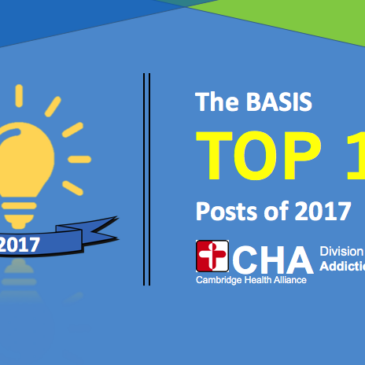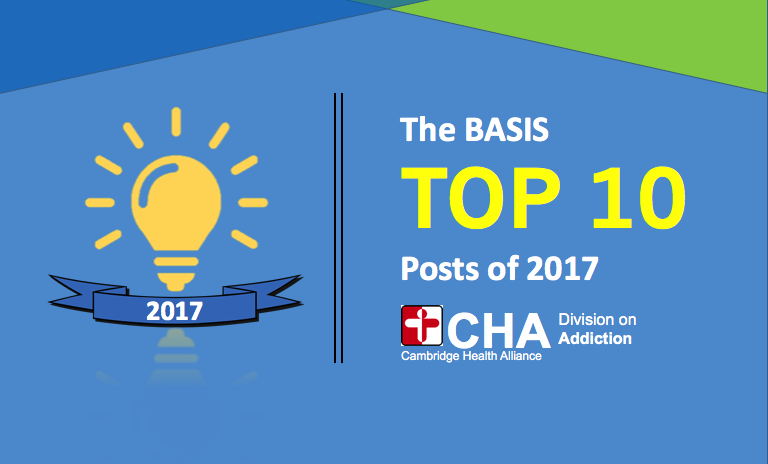Today, we reflect on our efforts to share addiction science during the past year. We hope that you’ve benefited from the material we’ve posted this year, from our weekly reviews of scientific studies of smoking, gambling, drinking, and other kinds of substance use to our editorials from researchers, treatment providers, and those who have personally experienced addiction.
We’d love to learn more about how you’ve used The BASIS in your own life, what posts you have personally enjoyed, and any topics you would be interested in hearing about moving into the new year! Please share your experiences by emailing us at basis@divisiononaddictions.org.
Without further ado, here are the most-read posts of 2017:
Our most popular post this year was Dr. Sally Gainsbury’s op-ed about the technological advances of online gambling and gambling advertising and their accessibility to youth. Exposure to these games and ads could have potentially dangerous impacts for future generations; more research is essential.
At #2 on our list, Dr. William Shadel enlightens us with an op-ed discussing the effectiveness of using vapes or e-cigarettes to quit smoking using a personal experience. Dr. Shadel reflects on how the available evidence suggests that vaping may be safer than cigarettes; however, vaping does not seem to help smokers quit smoking.
The use of marijuana as medicine is a hotly debated topic. The next post on our list is an op-ed brought to us by Drs. Ken Winters and Kevin Sabet. Here, they provide an overview of the key questions that surround this controversy. They conclude that more research must be done in order to learn more about how the legalization of marijuana impacts public health. This information can in turn be used to inform state policy.
Mindfulness as a treatment for addictive behaviors was a popular topic for our readers during 2017. Dr. Zev Schuman-Olivier, Executive Director and Research Director of the Cambridge Health Alliance Center for Mindfulness and Compassion, describes how mindfulness can be taught and used in practice. Schuman-Olivier has been researching mindfulness for years, and here he shares how it can be used, often in conjunction with other medications or therapies, to help those experiencing with addiction.
As another part of our Special Series on Mindfulness and Addiction, we were fortunate to have Dr. Katie Witkiewitz provide a behind-the-scenes description of the development of mindfulness research, beginning with the first NIH-funded study of mindfulness meditation as a treatment for addiction. Witkiewitz describes her more recent research expanding what we know about the connection between mindfulness and addiction recovery.
An important part of preventing and treating problem gambling is identifying risk factors. This research review described a study of Gambling Disorder among people completing a methadone maintenance program. The authors discovered that almost half (46%) of participants qualified for a Gambling Disorder diagnosis and many of these reported severe gambling problems. These gambling problems might complicate recovery from opioid dependence, and vice versa.
For some people, medications are important components of recovery from opioid dependence. This STASH reviewed a study that compared two such medications. People experiencing opioid dependence deserve highly effective treatment in whatever form—or combination of forms—appeals to them.
We learned from our Special Series on Mindfulness and Addiction that mindfulness is an emerging technique that encourages the development of more adaptive coping skills. This DRAM reviewed a study that used mindfulness to help depressed college students who were abusing alcohol to cope more effectively. Researchers suggest that those who are more mindful are able to adopt healthier coping mechanisms and resist drinking.
Is the craving to gamble biologically based? This post reviewed a study that examined the brain basis of gambling cravings among people experiencing Gambling Disorder. The findings have implications for clinicians’ understanding of craving and its powerful effects.
Rounding out our list at #10 is a science review that explored the relationship between gambling fallacies and gambling-related problems. People who gamble compulsively often hold mistaken beliefs about their control over gambling outcomes and other concepts. Which comes first—these gambling fallacies, or problem gambling behavior? The study reviewed in this post indicated that gambling fallacies precede gambling problems, but the relationship is complex.
Thank you for reading The BASIS during 2017! Use the Comment section to tell us which post was your favorite.
Best wishes for a happy holiday season.
Sincerely,
Alec Conte, BASIS Writer
Did you know that the Division on Addiction is entirely self-funded? That means that we rely on grants, contracts, and gifts to produce all of our work, including The BASIS. Please help us continue our work by making your year-end, tax-deductible donation to The BASIS today. Together we can continue to advance the public’s understanding of addiction and, ultimately, improve the lives of people touched by addiction. Any amount makes a difference. Please support us now with a donation.





